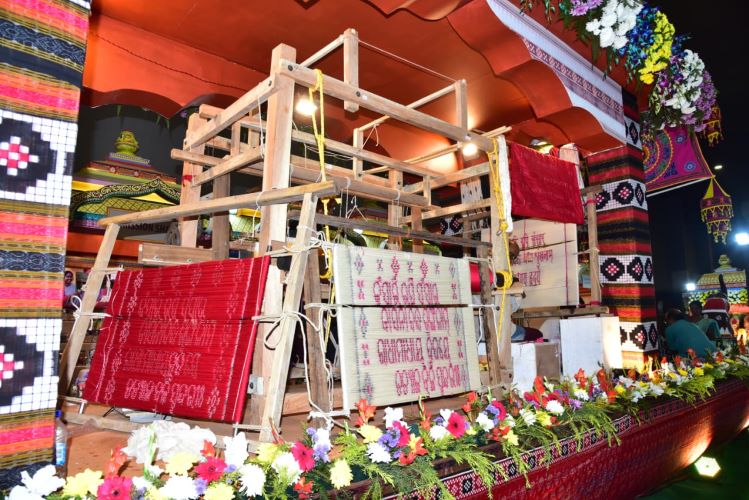Moving away from the traditional method, Odisha Weaves ‘Karuna Silk’ with compassion

Karuna Silk at Odisha Pavilion, IIFT 2023
Team L&M
Breaking the traditional trend of silk production, Odisha has adopted a non-violent method to extract silk from the silkworms. Promoting ethical and sustainable practises in the trade, the state thus weaves compassion naming the product as Karuna Silk.
The new initiative is drawing attention of the visitors at the ongoing India International Trade Fair (IITF) Pragati Maidan, New Delhi.
Promoted by Govt of Odisha, the skilled weavers from Routpada of Khordha District of the state are demonstrating their artistry live at IITF. The artisans, who make the holy Khandua Patta of Lord Jagannath for generations, are now weaving the same exclusively from Karuna Silk.
“The cruelty-free Karuna Silk, a new venture by Odisha, has become the USP at Odisha Pavilion this year. Visitors are taking a keen interest to know about this innovation story of ours,” says Sanjay Kumar Singh, Principal Secretary Information & Public Relations Department, Govt of Odisha. The department is the lead in conceptualising and setting of the State Pavilion at the trade fair.
Silk is the strongest natural fibre in the world. It is produced by controlled rearing of silkworms till they spin themselves into a cocoon on their journey to becoming a silk moth. These ultra-soft fibres are generally harvested from the cocoon in their raw state by boiling in hot water containing the innocent silkworm inside.
“Our Chief Minister always promotes the idea of non-violence and desires that all the production processes follow the same. So we wanted to promote compassion by breaking the traditional method of Filament Silk which kills the silk worms. In the new process, we let go of the moth honouring its life cycle,” says Shovan Krishna Sahu, Director, Department of Handlooms, Textiles & Handicrafts, Government of Odisha while narrating the story of transformation.
Odisha grows three types of Silk namely Mulberry, Tasar & Eri. Out of these three, the Eri Silkworms are reared in this new and compassionate method under the brand name of Karuna Silk. ’
“When the moth flies away from the cocoon it ruptures the fibre. Through the Worsted Spinning Process, we develop the silk fibre ready for dyeing & weaving. This humane process adopted by Odisha is being appreciated in the industry and beyond,” explains Sahu.
Under Govt. of Odisha’s 5T initiative, Karuna Silk was introduced as a pilot program involving about 700 sericulture farmers. This year the department has been able to expand the initiative to 14 districts with 2,500 silk farmers. The Eri Silkworm is nurtured on castor plants.
The Khandua Patta used in Jagannath Temple, Puri is unique for Ikat design along with the verses from Geeta Govinda by Poet Jaydev inscribed on it.
“We are happy to participate at this International Trade Fair supported by the Govt of Odisha. We are thankful for this opportunity to spread the story of compassion through Karuna Silk in front of the whole world,” says Ashok K Das, a participating weaver from Routpada in Khordha district of Odisha.
A veteran weaver from the same community, Gopinath Das has a similar story to unveil at the Odisha Pavilion.As per trade information, a typical Mulberry Silk Saree is produced by killing 10-20 thousand Silk worms. Similarly in the traditional process, 5-7 thousand innocent silk worms lose their life in the making of a Tasar Silk Saree. The innovation of Karuna Silk, blending tradition with technology along with fostering compassion, is a new benchmark in sustainable fashion.


